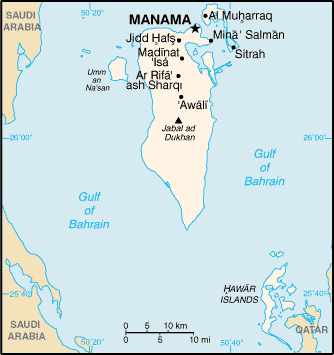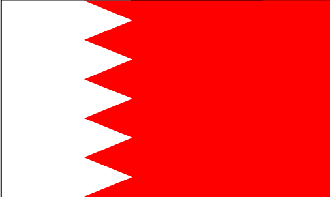
|
Bahrain
Background:
Bahrain's small size and central location among Persian Gulf countries require
it to play a delicate balancing act in foreign affairs among its larger
neighbors. Facing declining oil reserves, Bahrain has turned to petroleum
processing and refining and has transformed itself into an international
banking center. The new amir, installed in 1999, has pushed economic and
political reforms and has worked to improve relations with the Shi'a community.
In February 2001, Bahraini voters approved a referendum on the National Action
Charter - the centerpiece of the amir's political liberalization program. In
February 2002, Amir HAMAD bin Isa Al Khalifa proclaimed himself king. In
October 2002, Bahrainis elected members of the lower house of Bahrain's
reconstituted bicameral legislature, the National Assembly.
Location:
Middle East, archipelago in the Persian Gulf, east of Saudi Arabia.
Area: Total: 665 sq km, water: 0 sq km, land: 665 sq km.
Area - comparative: 3.5 times the size of Washington, DC.
Land boundaries: 0 km.
Coastline: 161 km.
Climate and Terrain:
Climate: Arid; mild, pleasant winters; very hot, humid summers
Terrain: Mostly low desert plain rising gently to low central escarpment
Natural resources: Oil, associated and nonassociated natural gas, fish, pearls.
People:
Population: 667,238 note: includes 235,108 non-nationals.
Ethnic groups: Bahraini 63%, Asian 19%, other Arab 10%, Iranian 8%.
Religions: Shi'a Muslim 70%, Sunni Muslim 30%.
Languages: Arabic, English, Farsi, Urdu.
Government:
Government type: Constitutional hereditary monarch.
Capital: Manama.
Independence: 15 August 1971 (from UK).
Economy overview:
In Bahrain, petroleum production and refining account for about 60% of export
receipts, 60% of government revenues, and 30% of GDP. With its highly developed
communication and transport facilities, Bahrain is home to numerous
multinational firms with business in the Gulf. Bahrain is dependent on Saudi
Arabia for oil granted as aid. A large share of exports consists of petroleum
products made from refining imported crude. Construction proceeds on several
major industrial projects. Unemployment, especially among the young, and the
depletion of oil and underground water resources are major long-term economic
problems.
Statistics:
Telephones - main lines in use: 152,000.
Telephones - mobile cellular: 58,543.
Radio broadcast stations: AM 2, FM 3.
Radios: 338,000.
Television broadcast stations: 4.
Televisions: 275,000.
Internet users: 140,200.
Railways: 0 km.
Highways: Total: 3,261 km.
Airports: 4.
Return to Visiting Locations
|

